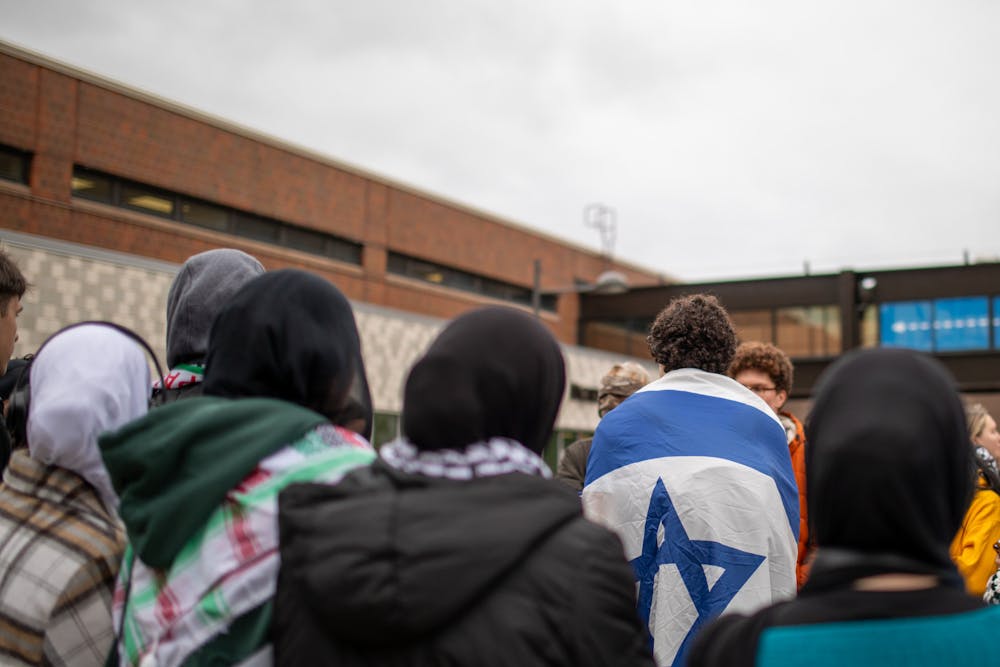A march in support of Israel and a counter-protest in support of Palestine met on UB’s academic spine Monday afternoon, as tensions escalated on campus surrounding the Israel-Hamas war.
Several dozen demonstrators marched down the spine from Alumni Arena to Founders Plaza, carrying Israeli flags and bearing photographs of missing persons and hostages kidnapped by Hamas, the militant organization that has controlled the Gaza Strip since 2007. The demonstrators paused in front of One World Café, where they sang Hebrew songs and chanted. The demonstration then returned to Alumni Arena, where organizers spoke.
At Founders Plaza, about as many demonstrators gathered on behalf of Palestinians. As the march passed by, a pro-Israel demonstrator with an Israeli flag draped over his shoulders argued with pro-Palestinian demonstrators. Several passers-by, on foot and in cars, shouted at the groups.
While tense, the demonstrations were relatively subdued compared to recent protests at Binghamton University and Columbia University. Protestors on both sides shared pain over the scale of the tragedy and a sense of loss from the conflict, though few of the students interviewed by The Spectrum expressed compassion for victims on the opposing side of the conflict.
The war began last Saturday, Oct. 7, when Hamas attackers based in Gaza launched a surprise attack on Israel, killing and kidnapping hundreds of people, an exceptionally violent flashpoint in ongoing conflict between the Israeli government and Hamas. Israel retaliated by shutting off vital services and supplies to Gaza and bombing buildings. The Israeli military is currently amassing troops at the border for an apparent ground invasion of northern Gaza and has ordered the evacuation of over 1 million Palestinian civilians from northern Gaza. Over 3,000 civilians, including children, have been killed in Israel and Gaza, and more than 10,000 have been wounded.
Students supporting Palestine criticized UB’s response to the developing war.
Sani, a cognitive science major who asked for her last name not to be disclosed, condemned the violence as “a humanitarian crisis.” She emailed UB President Satish Tripathi after she was “disgusted” by his statement on the conflict, in which he condemned Hamas’ initial attack but said nothing about Israel’s retaliation or the occupation of Gaza.
“Religion shouldn’t matter,” she said. “We should recognize genocide is wrong.”
As someone who wears a hijab, Sani said she noticed more passive hostility around campus this week.
“I can feel the stares, but no one’s said anything,” she said. “Maybe the staring was there already, but I’m noticing them more now.”
Gon Erez, chief program officer at the Jewish Community Center in Amherst, spoke at the pro-Israel march. He knows several people who are dead or missing, and he has family in Israel.
“I’m Israeli. I have 7 million brothers and sisters, of course, and I also have my own family there. They're all living there,” Erez said. “My parents, my sisters and my brother, and all my best friends. Everyone is there.”
Erez condemned those gathered in support of Palestine.
“It's unfortunate and horrific that these people still support and justify what happened,” he said.
UB officials from the Freedom of Assembly Support Team (FAST), including Dean of Students Dr. Tomás Aguirre and Vice President of Student Life Phyllis Floro, spoke with students attending the demonstrations. FAST, formed in 2017, is responsible for protecting students’ free speech at demonstrations and helped coordinate safety at today’s demonstrations, Floro said.
Misinformation about the war has run rampant. Social media has been filled with incorrect or misleading information about the war. Demonstrators interviewed by The Spectrum at both events repeated false information, and several cited social media platforms such as Twitter, TikTok and Instagram as a primary news source on the war.
Sol Hauser is a news editor and can be reached at sol.hauser@ubspectrum.com
The news desk can be reached at news@ubspectrum.com

Sarah Owusu is an assistant news editor at The Spectrum. In her free time she enjoys reading, baking, music and talking politics (yes, shockingly). She'll also be her own hairdresser when she needs a change.





